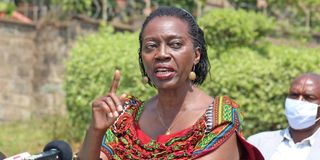Political space for women still very vicious

Narc-Kenya party leader Martha Karua.
What you need to know:
- The space for women's participation in political governance is still rough and vicious.
- In the last Parliament…there are men in my own county who were fearing me because they thought I was really a strong woman and I would want to be a governor - Millie Odhiambo.
- Women ought to pick the lessons learnt in the past 10 years and use them to strategise for better participation in political leadership and governance.
Even as Kenya seeks to enact laws on enhanced inclusion of women in leadership, the space for women's participation in political governance is still rough and vicious.
Male politicians instigating divide-and-rule among women, political parties turning against female leaders and failing to be deliberate in supporting implementation of the two-thirds gender principle standing in the way of women. These challenges were highlighted during a forum held last month in which female legislators, representatives from the civil society and grassroots women rights advocates attended.
Suba North MP, Ms Millie Odhiambo brought to light the realities of women in political leadership. She said women become targets of men’s divide-and-rule tactic intended to weaken women’s influence in leadership.
“In the last Parliament…there are men in my own county who were fearing me because they thought I was really a strong woman and I would want to be a governor, so they decided the best way to do that is to frustrate me and pull my star down,” she said during the forum organised by African Women’s Development and Communication Network (Femnet).
Support each other
“So they pit me against a fellow woman, the only thing I am very happy about is that they set for themselves poison, the woman is dealing with them thoroughly.”
Sisterhood, in which women support each other regardless of their ethnicity, political parties or socio-economic status enables women become formidable leaders, she said.
Ms Odhiambo said women gave her support when her own party was attacking her for being a promising strong woman leader.
“There was a period I was under very severe attack, the men were fighting me in my own party,” she said. “One day I woke up in the morning and found written on Facebook that ‘Millie Odhiambo is a mole’. I ignored it. I thought it was a joke but it spiralled out of control.”
Political leadership
Femnet’s Executive Director, Ms Memory Kachambwa said women ought to pick the lessons learnt in the past 10 years and use them to strategise for better participation in political leadership and governance. She said political parties ought to be deliberate in ensuring inclusion of women in decision-making organs. This decision, she said, would catalyse sustained representation and participation of women in local to national-level leadership.
“Let’s start with having more women in decision-making organs in the political structures,” she said.
The journey to enacting a law that would ensure not more than two-thirds of the same gender are elected or appointed to various institutions has been elusive and slippery.
In July, 2015, the then majority leader Mr Aden Duale introduced the Constitution of Kenya (Amendment) (No. 4) Bill, 2015 (Duale Bill) and whose progress is still stuck at the second reading.
2017 General Election
However, for four consecutive times from April 2016 to February, 2018, the bill would not attract the requisite numbers to proceed to third reading, a stage at which approval of the MPs would give the President the green-light to assent to it.
Duale Bill provided for special seats that will ensure the gender principle is realised in Parliament for a period of 20 years from 2017 General Election. The bill, being an amendment of the Constitution requires approval of the two-thirds of MPs in both second and third reading.
Kenya Women Parliamentary Association (Kewopa) chairperson, Ms Gathoni Wamuchomba said the male MPs defaulted on their promise of supporting the bill despite courteous enticement.
“We negotiated and bargained. We even bought them flowers and put them on their jackets just to show them how important they are in this debate. But when the day came to debate, the men abandoned us,” she said.
Narc-Kenya party leader Ms Martha Karua said the fact that neither arms of government has complied with the two-thirds gender principle calls for women’s solidarity towards realising impactful participation of women in leadership.
Our voices
“What if women in Parliament and political parties in one voice demanded actualisation of the gender principle?” she asked.
“What if in one voice women demanded from their parties’ equal share of nomination to contest winnable seats? Our voices would certainly be heard,” she said.
The 10th anniversary of the 2010 Constitution is a time for women to reflect on achievements, failures and obstacles in advancing inclusion of women in governance and change tact applicably, she said.





